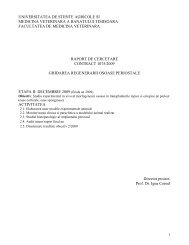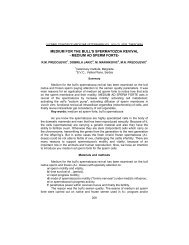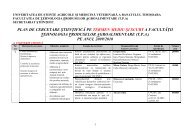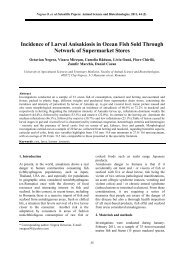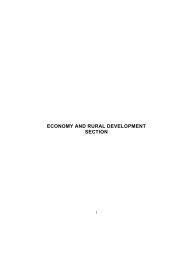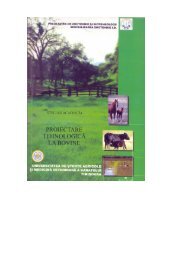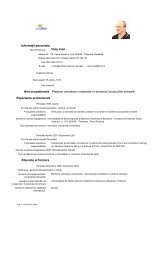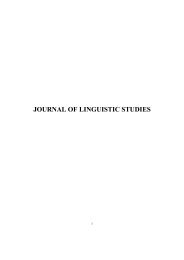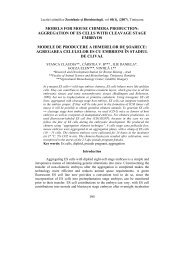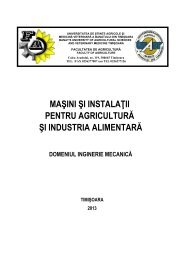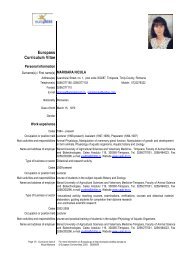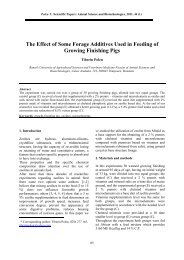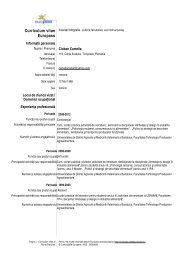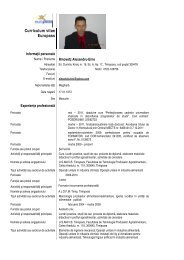Solutions for Destination Management on Agri-Tourism Farm
Solutions for Destination Management on Agri-Tourism Farm
Solutions for Destination Management on Agri-Tourism Farm
Create successful ePaper yourself
Turn your PDF publications into a flip-book with our unique Google optimized e-Paper software.
Petroman I. et. al./Scientific Papers: Animal Science and Biotechnologies, 2012, 45 (1)<br />
<str<strong>on</strong>g>Soluti<strong>on</strong>s</str<strong>on</strong>g> <str<strong>on</strong>g>for</str<strong>on</strong>g> <str<strong>on</strong>g>Destinati<strong>on</strong></str<strong>on</strong>g> <str<strong>on</strong>g>Management</str<strong>on</strong>g><br />
<strong>on</strong> <strong>Agri</strong>-<strong>Tourism</strong> <strong>Farm</strong><br />
Ioan Petroman, Cornelia Petroman, Diana Marin, C<strong>on</strong>stantin Buzatu, Adrian Dumitrescu,<br />
Ştefan Coman, Andreea Stan, Daniela Avramescu<br />
Banat's University of <strong>Agri</strong>cultural Sciences and Veterinary Medicine from Timisoara,<br />
Faculty of <strong>Agri</strong>cultural <str<strong>on</strong>g>Management</str<strong>on</strong>g>, 300645-Timişoara, Calea Aradului, 119, România<br />
Abstract<br />
<strong>Farm</strong> tourism can be an alternative to agricultural jobs in rural communities with real agri-tourism potential. To<br />
improve destinati<strong>on</strong> management, we need to implement a type of management based <strong>on</strong> knowledge management. A<br />
sec<strong>on</strong>d type of management that is a must in farm tourism is the integrated management of agri-tourism destinati<strong>on</strong><br />
quality based <strong>on</strong> a code of good practices in the integrated management of quality. In order to improve agri-tourism<br />
management quality, we need to apply best management practices, i.e. 15 basic principles that c<strong>on</strong>tribute to the<br />
improvement of farm tourism management. These three types of management, if implemented <strong>on</strong> any agri-tourism<br />
farm, can c<strong>on</strong>tribute to the improvement of destinati<strong>on</strong> management.<br />
Keywords: agri-tourism farm, improvement, management, soluti<strong>on</strong>s<br />
1. Introducti<strong>on</strong> <br />
Any farmer who wishes to turn his animal farm<br />
into a vegetal or animal agri-tourism farm and any<br />
owner of a rural boarding house who intends to<br />
turn his house into an agri-tourism boarding house<br />
will have to solve a few extremely important<br />
management issues [1, 3, 5, and 9]. Am<strong>on</strong>g these<br />
apparently minor issues of great importance <str<strong>on</strong>g>for</str<strong>on</strong>g><br />
the good functi<strong>on</strong>ing of an agri-tourism animal<br />
farm we need to menti<strong>on</strong> the following: knowing<br />
financial management through productivity<br />
analysis; cost analysis and m<strong>on</strong>itoring of inputs<br />
and outputs; knowing risk management through:<br />
the c<strong>on</strong>tact with state and local agri-tourism and<br />
rural tourism organisati<strong>on</strong>s and with keyc<strong>on</strong>sultants<br />
(insurance agents, lawyers,<br />
accountants, financial managers); developing risk<br />
management plans c<strong>on</strong>cerning farm safety,<br />
produce, insurance level, preventive measures;<br />
inventory of possible risk areas (employees, farm,<br />
*Corresp<strong>on</strong>ding author: Petroman Ioan,<br />
Email: i_petroman@yahoo.com<br />
456<br />
finances, produce, and understanding of the laws<br />
and rules c<strong>on</strong>cerning health and safety [2];<br />
properly knowing and applying regulati<strong>on</strong>s in<br />
the field of insurance (fire insurance, goods<br />
insurance, machines insurance, life insurance,<br />
health insurance, etc.); properly knowing and<br />
applying regulati<strong>on</strong>s in the field of animal biosafety<br />
and welfare [6, 7]; properly knowing and<br />
applying regulati<strong>on</strong>s in the field of taxati<strong>on</strong>;<br />
properly knowing and applying regulati<strong>on</strong>s in<br />
the field of labour: employee benefits; employee<br />
training; employee compensati<strong>on</strong>s; employee<br />
communicati<strong>on</strong>; assessment of per<str<strong>on</strong>g>for</str<strong>on</strong>g>mance;<br />
manager’s functi<strong>on</strong>s and resp<strong>on</strong>sibilities; keeping<br />
high morale am<strong>on</strong>g employees; issue solving;<br />
employee selecti<strong>on</strong>; job profile and establishment<br />
of organisati<strong>on</strong>al structure; properly knowing<br />
and applying regulati<strong>on</strong>s c<strong>on</strong>cerning: “good<br />
practices” [4, 10] in the food industry (buildings,<br />
equipments, maintenance; design, c<strong>on</strong>structi<strong>on</strong>,<br />
lighting, ventilati<strong>on</strong>, sanitary equipment,<br />
equipment cleaning, material manipulati<strong>on</strong>, pest<br />
c<strong>on</strong>trol); food services; organisati<strong>on</strong> of small zoos<br />
and domestic animal exhibiti<strong>on</strong>s; land planning;
Petroman I. et. al./Scientific Papers: Animal Sciences and Biotechnologies, 2012, 45 (1)<br />
health; acquiring the skills necessary in public<br />
relati<strong>on</strong>s: communicati<strong>on</strong> skills; inter-pers<strong>on</strong>al<br />
skills; patience.<br />
In order to achieve these goals, we need to<br />
observe a very detailed programme of the<br />
implementati<strong>on</strong> of rural agri-tourism or farm<br />
tourism activities and the principles of destinati<strong>on</strong><br />
management [8, 11].<br />
2. Materials and methods<br />
To achieve this scientific approach, we have<br />
analysed in detail the way in which destinati<strong>on</strong><br />
management impacts the development of a<br />
potentially real agri-tourism area to develop<br />
soluti<strong>on</strong>s that c<strong>on</strong>tribute to the improvement of<br />
destinati<strong>on</strong> management <strong>on</strong> agri-tourism farms<br />
that develop both agricultural (plant growing and<br />
animal breeding) and agri-tourism activities. The<br />
reas<strong>on</strong> why we insist <strong>on</strong> this aspect is that, <strong>on</strong> <strong>on</strong>e<br />
hand, <str<strong>on</strong>g>for</str<strong>on</strong>g>eign tourists interested in this type of<br />
tourism are already familiarised with this hybrid<br />
tourism and, <strong>on</strong> the other hand, Romanian tourists<br />
possibly interested in this type of tourism are not<br />
at all attracted by the perspective of carrying out<br />
agricultural activities: we should, there<str<strong>on</strong>g>for</str<strong>on</strong>g>e, offer<br />
them something else besides fruit picking or farm<br />
activities, e.g. some <str<strong>on</strong>g>for</str<strong>on</strong>g>m of entertainment.<br />
3. Results and discussi<strong>on</strong><br />
One of the most important aspects of management<br />
in farm tourism is, no matter the type of tourism<br />
practiced, destinati<strong>on</strong> management. This type of<br />
management is defined as the management of the<br />
flow of in<str<strong>on</strong>g>for</str<strong>on</strong>g>mati<strong>on</strong> from services providers<br />
and agri-tourism services directly to the<br />
c<strong>on</strong>sumers or indirectly, through commercial<br />
agents. <str<strong>on</strong>g>Destinati<strong>on</strong></str<strong>on</strong>g> management is the type of<br />
management based <strong>on</strong> knowledge management<br />
that, in the in<str<strong>on</strong>g>for</str<strong>on</strong>g>mati<strong>on</strong>al infrastructure c<strong>on</strong>stituted<br />
from methodologies, technologies, and practices,<br />
allows the development of necessary mechanisms<br />
and their access to reach certain goals in a<br />
business [1, 11].<br />
We c<strong>on</strong>sider that the main steps in knowledge<br />
management are as follows: accessing valuable<br />
knowledge from external sources; facilitating the<br />
increase of knowledge volume; generating new<br />
knowledge; integrating knowledge into processes,<br />
457<br />
produce and/or services; measuring knowledge<br />
value and management impact; representing<br />
knowledge; transferring existing knowledge to all<br />
involved parties; using accessible knowledge in<br />
decisi<strong>on</strong>-making.<br />
Technological comp<strong>on</strong>ents are extremely<br />
important in the management of theoretical and<br />
practical knowledge c<strong>on</strong>cerning farm agritourism<br />
nowadays <str<strong>on</strong>g>for</str<strong>on</strong>g> reas<strong>on</strong>s more than obvious<br />
[4]. These comp<strong>on</strong>ents are as follows: a collecti<strong>on</strong><br />
of documents (a database that c<strong>on</strong>tains a large<br />
number of digital objects – documents, photos,<br />
notes, texts, etc. – usually called a knowledge<br />
base); a graphical representati<strong>on</strong> <str<strong>on</strong>g>for</str<strong>on</strong>g> the<br />
virtualisati<strong>on</strong> of the semantic c<strong>on</strong>tent of the<br />
database whose main comp<strong>on</strong>ent is a system of<br />
keywords in which each element of the document<br />
collecti<strong>on</strong> is associated with a set of keywords<br />
grouped into classes to ease the search; an access<br />
system that offers browsing and navigating<br />
instruments allowing the introducti<strong>on</strong> of new<br />
in<str<strong>on</strong>g>for</str<strong>on</strong>g>mati<strong>on</strong>, the establishment of attributes <str<strong>on</strong>g>for</str<strong>on</strong>g><br />
these in<str<strong>on</strong>g>for</str<strong>on</strong>g>mati<strong>on</strong>, and the management of<br />
allowances and properties. The sec<strong>on</strong>d type of<br />
management absolutely necessary in farm agritourism<br />
management is the integrated<br />
management of quality in agri-tourism<br />
destinati<strong>on</strong>s. To improve destinati<strong>on</strong> management<br />
<strong>on</strong> agri-tourism farms, we need to develop a code<br />
of good practices in the integrated management of<br />
quality (IMQ) in agri-tourism destinati<strong>on</strong>s (Table<br />
1).<br />
This is how we can design all the necessary<br />
elements of a quality agri-tourism activity <strong>on</strong> the<br />
farm – attracti<strong>on</strong>s and events; accommodati<strong>on</strong>;<br />
marketing and communicati<strong>on</strong>; envir<strong>on</strong>ment and<br />
infrastructure; recepti<strong>on</strong>, guidance, and<br />
in<str<strong>on</strong>g>for</str<strong>on</strong>g>mati<strong>on</strong>; local products and gastr<strong>on</strong>omy;<br />
recreati<strong>on</strong> in the countryside: attracti<strong>on</strong>s and<br />
events, with preservati<strong>on</strong> of authenticity and<br />
distinctiveness; accommodati<strong>on</strong> at com<str<strong>on</strong>g>for</str<strong>on</strong>g>t<br />
standards comm<strong>on</strong> to civilisati<strong>on</strong>, with<br />
preservati<strong>on</strong> of traditi<strong>on</strong>al elements; marketing<br />
and communicati<strong>on</strong>, with preservati<strong>on</strong> of visitor<br />
c<strong>on</strong>tact and through the broadcasting of messages<br />
and images that do not engender false expectati<strong>on</strong>s<br />
from the visitors; envir<strong>on</strong>ment and<br />
infrastructure, with good transportati<strong>on</strong><br />
c<strong>on</strong>diti<strong>on</strong>s and with preservati<strong>on</strong> of envir<strong>on</strong>mental<br />
quality; friendly recepti<strong>on</strong>, guidance, and<br />
effective in<str<strong>on</strong>g>for</str<strong>on</strong>g>mati<strong>on</strong> of the visitors no matter the<br />
time and place; local products and gastr<strong>on</strong>omy,
Petroman I. et. al./Scientific Papers: Animal Sciences and Biotechnologies, 2012, 45 (1)<br />
Table 1. Code of good practices in the Integrated <str<strong>on</strong>g>Management</str<strong>on</strong>g> of Quality (IMQ) in rural tourism<br />
Goal of IMQ - improving visitor satisfacti<strong>on</strong><br />
- local ec<strong>on</strong>omy;<br />
IMQ tries to improve:<br />
- envir<strong>on</strong>ment;<br />
- life quality of the local community.<br />
- establishing objectives;<br />
- cooperating;<br />
IMQ suggests:<br />
- understanding visitors;<br />
- establishing standards;<br />
- getting feed-back from visitors;<br />
- improving;<br />
- checking impacts.<br />
through the strengthening of the relati<strong>on</strong>ship<br />
between gastr<strong>on</strong>omy, food producti<strong>on</strong>, agriculture,<br />
and farm aspect maintenance; recreati<strong>on</strong> in the<br />
countryside, through hitchhiking, cycling, and<br />
sports that can be practiced in the countryside.<br />
A third type of management essential in farm agritourism<br />
is “best management practices” based<br />
<strong>on</strong> the following main aspects: developing good<br />
community relati<strong>on</strong>ships; maintaining a safe,<br />
accessible envir<strong>on</strong>ment; offering authentic<br />
458<br />
experiences at the farm; offering educati<strong>on</strong>al<br />
experiences; offering proper public facilities;<br />
offering excellent pers<strong>on</strong>alised services; planning<br />
financial future.<br />
Starting from these aspects, and aiming at<br />
improving destinati<strong>on</strong> management <strong>on</strong> agritourism<br />
farms, we need to develop a code that<br />
c<strong>on</strong>tains 15 principles that c<strong>on</strong>tribute to the<br />
improvement of farm management (Table 2).<br />
Table 2. Principles of the code of good management practices<br />
Principle Details<br />
Care of details Supplying enough in<str<strong>on</strong>g>for</str<strong>on</strong>g>mati<strong>on</strong>, checking the equipment, supplying<br />
supplementary services<br />
Authenticity H<strong>on</strong>ouring and celebrating special rural heritage by real presentati<strong>on</strong>s<br />
Clear communicati<strong>on</strong> Effective communicati<strong>on</strong> with all involved parties<br />
Commitment Transmitting enthusiasm to all the parties involved<br />
Distinctiveness Supplying special and distinct features and destinati<strong>on</strong> flavour<br />
Sustainability <str<strong>on</strong>g>Management</str<strong>on</strong>g> of tourism impact<br />
Inclusiveness Equal treatment <str<strong>on</strong>g>for</str<strong>on</strong>g> all the visitors, including special needs <strong>on</strong>es<br />
Integrati<strong>on</strong> Care <str<strong>on</strong>g>for</str<strong>on</strong>g> quality should be integrated in all the tourism functi<strong>on</strong>s of the<br />
destinati<strong>on</strong><br />
Interdependency Interdependency between tourism, agriculture, crafts, transportati<strong>on</strong>, and local<br />
services<br />
M<strong>on</strong>itoring M<strong>on</strong>itoring and assessing the impact <strong>on</strong> visitors, enterprises, envir<strong>on</strong>ment, and<br />
local community<br />
C<strong>on</strong>sumer orientati<strong>on</strong> Closeness to the visitor, understanding his needs, and checking the way in<br />
which these needs have been met<br />
Partnership Cooperating with small tourism enterprises, tourism organisati<strong>on</strong>s, and<br />
community<br />
Rati<strong>on</strong>alisati<strong>on</strong> Giving-up sub-standard activities, or combining them to produce superior<br />
activities<br />
Market realism In<str<strong>on</strong>g>for</str<strong>on</strong>g>med and realistic assessment of the area potential <strong>on</strong> the market, with<br />
identificati<strong>on</strong> of very genuine competitive points<br />
Time Planning c<strong>on</strong>stant steps to take<br />
C<strong>on</strong>clusi<strong>on</strong>s<br />
<strong>Agri</strong>-tourism potential cannot be valorised if the<br />
people involved in tourism, tour-operators and<br />
tourists, have no access to a few elements<br />
necessary to practice tourism: a travel agency that<br />
recommends the best places to practice farm agritourism;<br />
a means of transport that takes you to the
Petroman I. et. al./Scientific Papers: Animal Sciences and Biotechnologies, 2012, 45 (1)<br />
wanted place; a place to be accommodated; a<br />
place to get good food; <strong>on</strong>e or several places to<br />
have fun as you wish.<br />
The appearance of new distributi<strong>on</strong> channels and<br />
of changes of power structures has lead to changes<br />
of priorities in the field of distributi<strong>on</strong> and of<br />
managerial decisi<strong>on</strong>s now that distributi<strong>on</strong> has<br />
become, <str<strong>on</strong>g>for</str<strong>on</strong>g> many tour-operators, a critical aspect<br />
of strategic management.<br />
Of all the reas<strong>on</strong>s why any tour-operator should be<br />
successfully distributed, we can menti<strong>on</strong> the<br />
following: profit margins are narrow: many travel<br />
agencies obtain small profits with high costs of<br />
distributi<strong>on</strong> there<str<strong>on</strong>g>for</str<strong>on</strong>g>e this is the field in which<br />
managers can save m<strong>on</strong>ey; distributi<strong>on</strong> is a very<br />
competitive sector; intermediary power is high,<br />
which makes this aspect of marketing mix<br />
important; global market enhances a proper<br />
distributi<strong>on</strong> of management; tourism product<br />
perishability and the necessity associated to it of<br />
removing any stock in excess at the last minute;<br />
in<str<strong>on</strong>g>for</str<strong>on</strong>g>mati<strong>on</strong> intensity is crucial in decisi<strong>on</strong>making,<br />
since it needs to reach c<strong>on</strong>sumers<br />
properly and timely – hence the crucial<br />
importance of the management of the flow of<br />
in<str<strong>on</strong>g>for</str<strong>on</strong>g>mati<strong>on</strong>.<br />
Another important role is that of the integrated<br />
management of tourism destinati<strong>on</strong> quality, and<br />
the soluti<strong>on</strong>s to be applied should include a code<br />
of good management practices.<br />
Best management practices should be based <strong>on</strong><br />
minimum 15 principles that c<strong>on</strong>tribute to the<br />
improvement of agri-tourism farm management<br />
through the development of new products and<br />
specific brands.<br />
459<br />
References<br />
1. Baggio, R. The Strategic Role of Knowledge in the<br />
<str<strong>on</strong>g>Management</str<strong>on</strong>g> of <strong>Tourism</strong> <str<strong>on</strong>g>Destinati<strong>on</strong></str<strong>on</strong>g> Organisati<strong>on</strong>s.<br />
WTO – Themis Foundati<strong>on</strong> / University of Catalunya,<br />
2004.<br />
2. Beet<strong>on</strong>, Sue., Community Development through<br />
<strong>Tourism</strong>. Collingwood, Australia: Land Lins, 2006<br />
3. Chang, P. R<strong>Tourism</strong> <str<strong>on</strong>g>Management</str<strong>on</strong>g> in the 21 st<br />
Century. New York: Nova Science Publishers, Inc.,<br />
2007.<br />
4. Chase, Lisa, Ramaswamy, Varna, Burr, S.W.,<br />
Zeitlin, Jascha, Green, G.P. & Dougherty, M., Best<br />
<str<strong>on</strong>g>Management</str<strong>on</strong>g> Practices in <strong>Agri</strong>tourism. Iowa State<br />
University. <strong>Agri</strong>cultural Marekting Resource Center,<br />
2007.<br />
5. Daniels, B., Powell, J. & Rottman, Susan, Promoting<br />
the <strong>Farm</strong> or Ranch Recreati<strong>on</strong> Business. University of<br />
Wyoming. Cooperative Extensi<strong>on</strong> Service. College of<br />
<strong>Agri</strong>culture, 2001.<br />
6. Pender, L., Managing tourism distributi<strong>on</strong>. In<br />
Pender, L. & Sharpley, R. (Eds.). The <str<strong>on</strong>g>Management</str<strong>on</strong>g> of<br />
<strong>Tourism</strong>. L<strong>on</strong>d<strong>on</strong> – Thousand Oaks – New Delhi:<br />
SAGE Publicati<strong>on</strong>s, 2005, 67-83.<br />
7. Petroman I., Petroman Cornelia, Popescu Janina,<br />
Triscău I., Marin Diana, Nati<strong>on</strong>al policies in the field of<br />
agritourism, <strong>Agri</strong>culture and Countryside of climate<br />
Change and Recessi<strong>on</strong>, 2010, 5, Hodmezovararhely,<br />
Ungaria<br />
8. Petroman I., Trişcău I., <strong>Tourism</strong> distributi<strong>on</strong><br />
management, <str<strong>on</strong>g>Management</str<strong>on</strong>g> of Durable Rural<br />
Development, 2010, I, XII (3), Timişoara<br />
9. Petroman, I., <str<strong>on</strong>g>Management</str<strong>on</strong>g>ul turismului cultural în<br />
Judeţul Timiş: Politici de intervenţie. Timişoara,<br />
Editura Eurostampa, 2010.<br />
10. Sharpley, R., The Accommodati<strong>on</strong> Sector:<br />
Managing <str<strong>on</strong>g>for</str<strong>on</strong>g> Quality. In Pender, L. & Sharpley, R.<br />
(Eds.). The <str<strong>on</strong>g>Management</str<strong>on</strong>g> of <strong>Tourism</strong>. L<strong>on</strong>d<strong>on</strong> –<br />
Thousand Oaks – New Delhi: SAGE Publicati<strong>on</strong>s,<br />
2005, 14-27.<br />
11. Trişcău. I., Petroman I., Marin Diana <str<strong>on</strong>g>Destinati<strong>on</strong></str<strong>on</strong>g><br />
management, <str<strong>on</strong>g>Management</str<strong>on</strong>g> of Durable Rural<br />
Development, 2010, I, XI (3), Timişoara



